Hay Festival #6: NoViolet Bulawayo and Meike Ziervogel
The last of my blatherings on Hay Festival 2013; I’ve saved the heart-breakers until last.
NoViolet Bulawayo: Revisiting and celebrating her childhood in Zimbabwe.
NoViolet Bulawayo and Meike Ziervogel both delve into national traumas in their recent novels and both do so through a child’s point of view. On the final day at Hay I attended their emotionally charged event, which was introduced by Gaby Wood.
In NoViolet Bulawayo’s We Need New Names, 10-year-old Darling lives in a shanty named Paradise and, through her eyes, we glimpse the turmoil of Zimbabwe’s recent history. According to the author, ‘A child’s eye view depoliticises events and suspends my own belief. You have to tone it down; readers can easily be put off. But it was also fun because it allowed me to return to my childhood. It was a celebration.’
NoViolet was born in Tsholotsho a year after Zimbabwe gained independence from British colonial rule. When she was 18, her aunt was able to bring NoViolet to Michigan. In 2011, she won the Caine Prize for African Writing.
We Need New Names (Chatto & Windus) was inspired by ‘the lost decade from 2000 when everything crashed due to the failure of leadership,’ said NoViolet. ‘Children of the post-1980 generation were called the born-frees. That dream was shattered. I’ve just been back to Zimbabwe for the first time in 13 years and I saw a generation that has never known normality.’
NoViolet read Chapter 10 the Hay audience – How They Left. Just two pages long – heart-breaking stuff. Here’s a short extract:
When things fall apart, the children of the land scurry and scatter like birds escaping a burning sky. They flee their own wretched land so their hunger may be pacified in foreign lands, their tears wiped away in strange lands, the wounds of their despair bandaged in faraway lands, their blistered prayers muttered in the darkness of queer lands.
The novel is semi-autobiographical and NoViolet told the audience she’d set out to ‘demystify the American dream.’
Meike Ziervogel ran away from the ‘immense deadness’ in post-war Germany.
Meike Ziervogel delved further back in time. Magda is a portrayal of Magda Goebbels, wife of Hitler’s propaganda minister Joseph Goebbels. She is infamous for murdering her six children and committing suicide in Hitler’s Berlin bunker. The novel looks closely at Magda’s ‘destructive’ relationship with her mother.
‘She’s been turned into a monster and people want to leave her as that. By demonizing her we make her irrelevant… I think she was highly deluded and could not cope with her insecurities.’
Magda Goebbels, said Meike, had been in love with a leading Zionist. She learned Hebrew, but he left her to marry a Jewess. ‘Magda fell for very charismatic powerful men and she wanted them to fulfill her dreams.’
What would have happened if Magda had not murdered her children, the author asked? She suggested the children would have shared her own experience of the post-war years. ‘I grew up without any mention of the war… My parents and grandparents helped rebuild Germany but they never looked back emotionally.’ And she later explained, ‘I literally ran away from Germany after high school. I had to get away from this immense deadness. The child’s voice in my novel allows me to come to terms with that deadness without analyzing it. I can analyze now, but I can’t explain the feeling.’
Meike Ziervogel has written four novels but Magda is the first to be published (by Salt). She lives in London and set up Peirene Press, which specializes in contemporary European novellas in English translation.
A nice cuppa tea for NoViolet.
‘My job as a novelist is to forget the facts, to go really deep and find the emotional charge.’ Throughout the novel, Magda’s voice is narrated in third person whereas the other characters are first person narratives.
Gaby Woods asked both authors about writing in a second language. According to Meike Ziervogel: ‘My first two novels were written in German and then reworked in English. Magda was conceived in German – it was raw – and I used English to get that artistic distance. I like English with the verb at the beginning instead of at the end. It helps you to stay with the action.’
And NoViolet Bulawayo: ‘I try to post snippets in Ndebele. But the kids are speaking something weird now, a mix; the authentic language is under threat.’
Future writing projects?
NoViolet: ‘I’m working on a collection of AIDS stories – things that matter, and I’ve experienced in my own family. There’s a silence. We pin in down to other sicknesses so I’m trying to address that.’
Meike: ‘I’m working on a story about love between a mature couple whose children have grown up. It’s always about love.’
And on that up-note I shall shelve my notebooks from Hay Festival 2013. If you didn’t make it to Hay this year, I hope these postings will allow you to blag that you did.




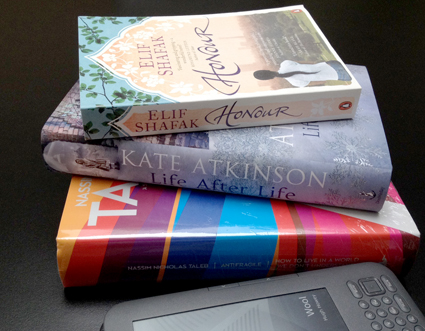

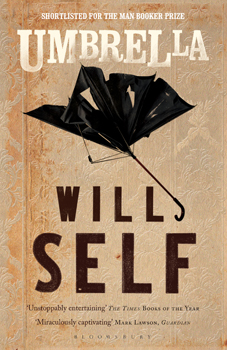

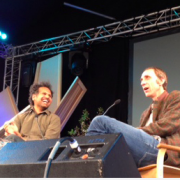
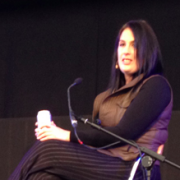

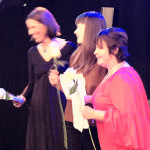
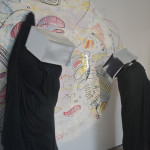
Leave a Reply
Want to join the discussion?Feel free to contribute!